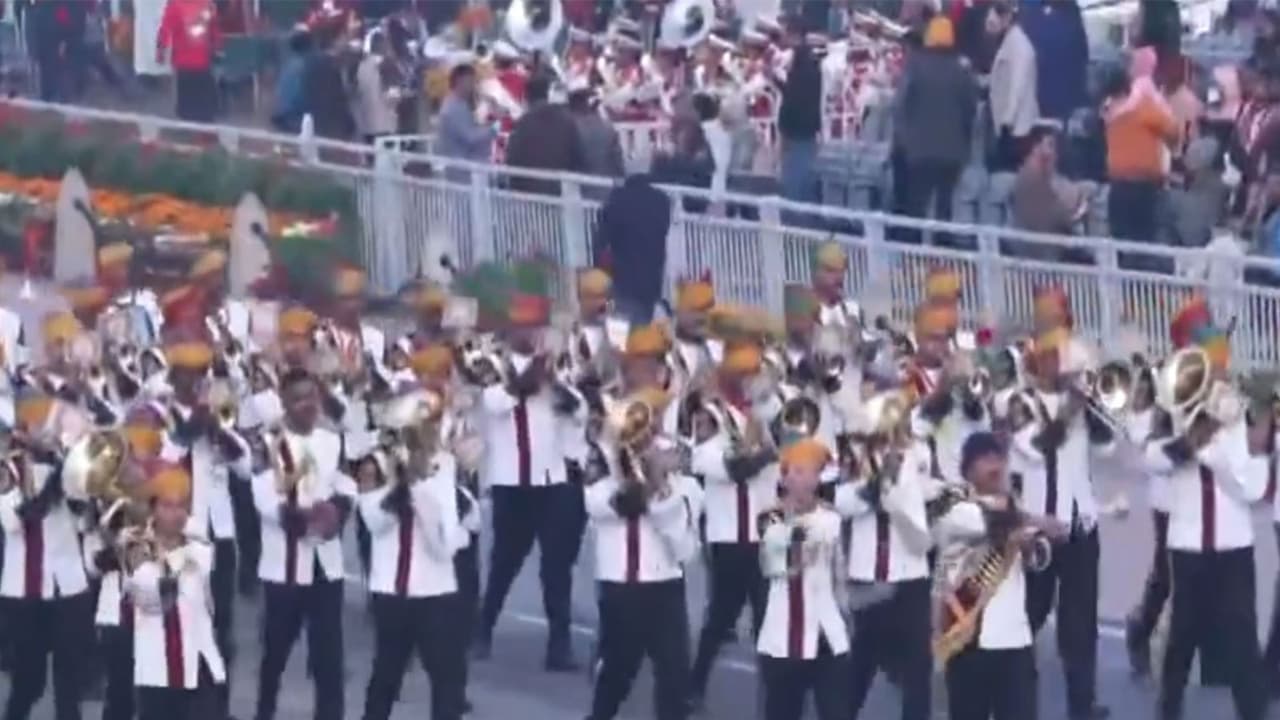Preparations are underway at Kartavya Path for India’s 77th Republic Day. Delhi is on high alert with intense security checks and traffic restrictions. The President will preside, with EU leaders attending as Chief Guests for the grand parade.
Preparations are underway at Kartavya Path as India celebrates its 77th Republic Day on Monday, with the nation coming together to mark the adoption of the Constitution and showcase its rich cultural and military heritage.
Security and Traffic Arrangements
The national capital has been placed on high alert on the occasion, with intensified security checks underway across the Delhi-NCR region. Police personnel conducted thorough vehicle checks at Gurugram, Chilla, Tikri, Singhu, Kapashera, Badarpur, and Dhaula Kuan borders amid heightened security arrangements for the Republic Day celebrations.
Traffic Advisory for Vehicles
Furthermore, the Delhi Traffic Police has issued a detailed advisory for vehicle movement, parking, and public access in the city. Sharing a video advisory on X, Delhi Traffic Police wrote, “HGVs/LGVs and commercial vehicles coming from outside Delhi are requested not to enter the city from 11:00 PM on 25 January to 1:30 PM on 26 January 2026.”
Rajeev Kumar, Deputy Commissioner of Police (DCP) (Traffic), Delhi Police, further said, “All local HGVs/LGVs and commercial vehicles are requested not to ply on the Ring Road between ISBT Sarai Kale Khan and ISBT Kashmere Gate from 7:30 AM to 1:30 PM on 26 January 2026.”
To ensure smooth movement during the event, the Traffic Police has installed directional boards and banners at multiple locations. “You are requested to follow them,” the advisory said. Pedestrians have been urged to use footpaths and keep roads clear.
Guidelines for Attendees
Strict security measures have been put in place for parade attendees. Guests are advised not to share invitation cards and to keep entry passes ready along with a government-issued photo ID. The advisory cautioned against carrying prohibited items, including bags, electronic devices, water bottles, flammable materials, and sharp objects. Only children aged 5 or older will be allowed entry. Attendees are requested to report any suspicious person, object, or explosive device to the nearest security personnel immediately. All attendees are instructed to walk in a queue inside chain barriers on the footpath, remain in designated seating areas, and follow the instructions of security personnel. Additionally, Metro services will begin early, with all stations available from 3:00 am onwards.
Grand Celebrations at Kartavya Path
Meanwhile, President Droupadi Murmu will preside over the grand celebrations. The President of the European Council, Antonio Costa, and the President of the European Commission, Ursula von der Leyen, will attend as the Chief Guests on this momentous occasion. This year, Kartavya Path, stretching from Rashtrapati Bhawan to the National War Memorial, has been elaborately decorated to showcase India’s remarkable journey. The celebrations will feature an extraordinary blend of the 150-year legacy of the national song ‘Vande Mataram’, the country’s unprecedented developmental progress, robust military strength, vibrant cultural diversity, and active participation from citizens across all walks of life, according to the release from the Ministry of Defence.
Ceremony Commencement
The ceremony will commence at 10:30 am and run for approx. 90 minutes. It will start with Prime Minister Narendra Modi’s visit to the National War Memorial, where he will lead the nation in paying solemn tributes to fallen heroes by laying a wreath. Thereafter, the Prime Minister and other dignitaries will head to the saluting dais at Kartavya Path to witness the parade.
President’s Arrival and National Salute
The arrival of President Murmu, the President of the European Council, and the President of the European Commission in the ‘Traditional Buggy’ will be escorted by the President’s Bodyguard, the senior-most regiment of the Indian Army. As per tradition, the National Flag will be unfurled, which will be followed by the National Anthem with a thunderous 21-gun salute using 105 mm Light Field Guns, an indigenously developed artillery weapon system. The 21-gun Salute will be presented by the 1721 Ceremonial Battery of the 172nd Field Regiment.
Highlights of the Parade
Almost 100 cultural artists will be heralding the parade, on the theme ‘Vividata Mein Ekta – Unity in Diversity’, which is set to be a grand presentation of musical instruments that will demonstrate the nation’s unity and rich cultural diversity.
Showering of flower petals will be carried out by four Mi-17 1V helicopters of the 129 Helicopter Unit in the Dhwaj Formation. Trooping the National Flag, this formation of helicopters will be led by Group Captain Alok Ahlawat.
The parade will then begin with the President taking the salute. The parade will be commanded by Parade Commander Lieutenant General Bhavnish Kumar, General Officer Commanding, Delhi Area, a second-generation officer. Maj Gen Navraj Dhillon, Chief of Staff, HQ Delhi Area, a third-generation Army officer, will be the Parade Second-in-Command.
Tableaux Showcase
A total of 30 tableaux – 17 of States/Union Territories and 13 of Ministries/Departments/Services – will roll down with a broad theme of ‘Swatantrata ka Mantra: Vande Mataram’ and ‘Samriddhi ka Mantra: Aatmanirbhar Bharat’. The tableaux will showcase a unique mix of 150 years of the national song Vande Mataram and the nation’s rapid progress on the back of growing self-reliance across sectors, set against its rich and vibrant cultural diversity. (ANI)
(Except for the headline, this story has not been edited by Asianet Newsable English staff and is published from a syndicated feed.)
